
Biology
202
Neurobiology and Behavior
Spring 2004


| Biology
202 | 
|
Who are we?
| Biology major? | 16 |
| Psychology major? | 3 |
| NBS concentrator? | 6 |
| Other majors? .... (Polisci 5, English 5, Philosophy 3, Anthro 2, postbacc 2, Russian 2, Chem, History, French, Comp Lit, Art History, Religion) | 19 |
| Satisfy science requirement | 9 |
| Undecided | 2 |
| Interested in biology/nervous system? | 21 |
| Interested in psychology/behavior? | 21 |
| Interested in philosophy/nature of reality/human experience? | 13 |
Disturbed by/want to understand headlines about research on nervous
system/behavior?
| |
| Want to understand who you are? why you/other people behave the way you/they do? What you/they can do about it? | 19 |
| Other? .... Curious about creativity, autism, sexuality, race, ADD, sleep/dreams, consciousness, spirituality, mental illness, nature/nurture, evolution, brain giving rise to mind, perception and technology, personality, behavioral genetics, relation of individual to community, relation of humans to animals | lots |
Neurobiology and BEHAVIOR ... what is "behavior"?
See "Other? Curious about ..." above
Walking, breathing, talking etc ... the observable from the outside |
NEUROBIOLOGY and behavior ... Neurobiology = study of the nervous system ... what is the "nervous system"?
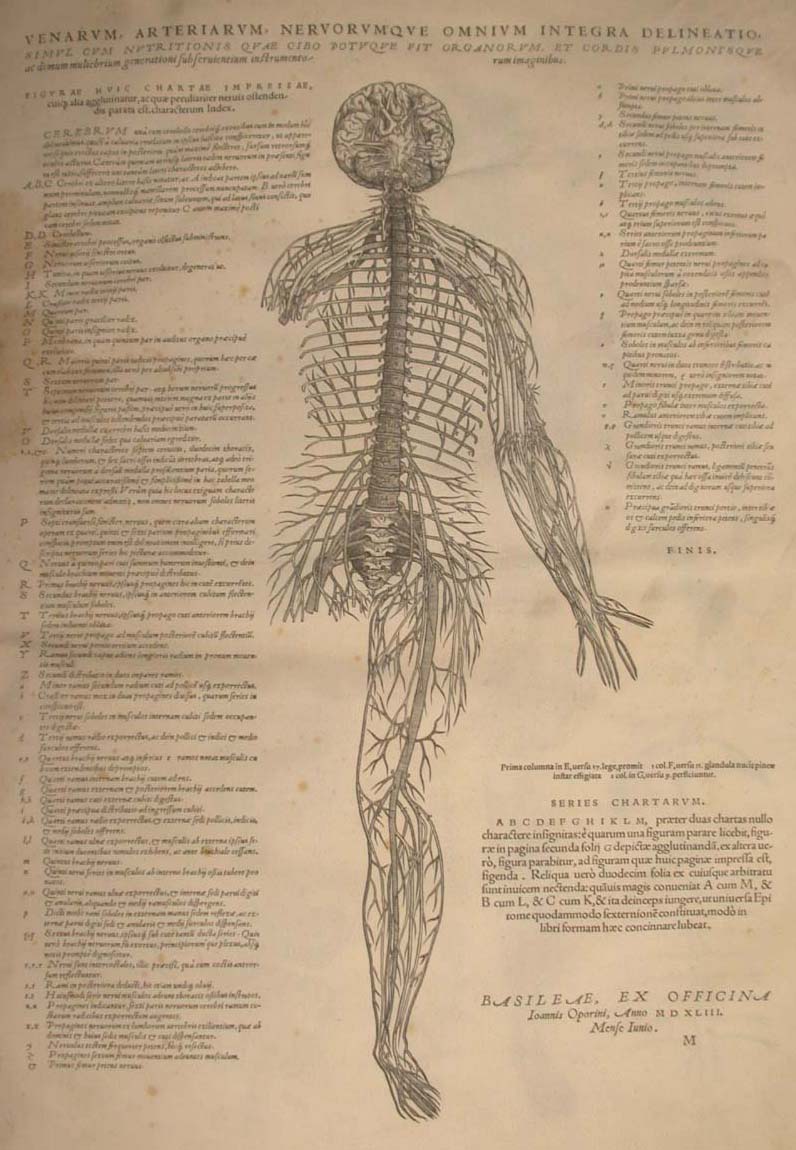
| Image by Andreas Vesalius (1514-1564), contemporary of Copernicus, suggested (less than 500 years ago) that nervous system rather than heart was origin of behavior (see Milestones in Neuroscience Research for a time line extending from 4,000 B.C.). | 
| Image by Rene Descartes (1596-1650). Set framework for several centuries (and continuing) discussion: mind and body distinct things or same thing? |
Nervous system is material object, part of body, can be touched, manipulated, measured. What IS relationship between mind/body? between mind/brain? between brain (nervous system) and behavior? | |||
| Agree with Dickinson et al. | 24 |
| Disagree with Dickinson et al. | 14 |
| Unsure/fence-sitting | 5 |
Implies:
|
Brain = behavior?, from a "scientific" approach:
Issue is
not "Truth" but whether it is a good "summary of observations", "working
hypothesis", helps to get it continually "less
wrong" ...
Course is about the "trend of the evidence":
Forum area this weekend: YOUR thoughts on "brain=behavior", on science, on ... ?
Starting with what one thinks .... and getting used to/seeing the advantages of being wrong
|
The sensory neurons contact motor neurons in the spinal cord, which will activate a reaction in the quadriceps muscles causing the lower leg to kick. I think this is a clear example of the brain not equaling behavior ... Kimberley
How about those certain species which do not posess a brain, nor by that an organized nervous system (maybe ants? or certain bugs? or snails? -- I maybe wrong here) ... Aiham To a certain degree we functionally are all just aggregates of a number of reactions which take place within our bodies. We are prisoners to the constraints of physical matter in what we often concieve to be our metaphysical palace ... Michael
So is there a neurological reason that women tend to be stereotyped as the emotional gender, and men are the stereotypes as more easily aroused? Just curious ... Elissa When she was 4, my sister develped a fear of getting sick and throwing up, and we think it may have been caused by my throwing up in the car that day. If that was in fact the root of the phobia, it is interesting that the phobia didn't surface until a few years later ... Eleni it shows us that behavior can exist only within the brain, or the internal world created by the brain (are these two different or one and the same??), totally distinct from the outside world. Is this not direct evidence that the behavior resides in the brain and the brain alone, even if it at times seeps out into the world around us? ... Emily HR This references what Eleni said about her sister and being afraid of getting carsick- was her sister aware of why she felt that way? Probably not. In all likelyhood, that memory was completely lost to her-without other witnesses to make the connection for her, she would never know where it came from ... Chelsea If the brain is the self, and the self changes through psychoanalytical therapy, then the brain is ultimately changed. Similarly if the brain receives more serotonin and a person's mood is uplifted, the self is changed by changing the brain. Is it a two way street of change? ... Jenny I do not like the idea though that I am changing every second. I believe that the core of me stays the same. I don't want to think how I change and am thus not myself ... Amanda in some ways our self is the accumulation of everything that has happened in the past—but living in the present is either a reaffirmation of past behaviors or a new adaptation to our environment ... Lindsey based on the lack of evidence between memory and some biological aspect of the brain, I have to side with Descartes about the notion of a dualistic Soul/mind from the brain. The brain as I understand it is something that is composed of chemicals and organs which reacts in a very mechanical manner. Although we may know the organs involved in memory and emotion, I think that this abstract idea of a soul/mind is in fact the missing link between these feelings and the scientific aspect ... Amar I personally see the difference between the mind and the brain as being the difference between the concious and the unconcious and I think that most things sort of float up from the unconcious, which is why it's so difficult to change behaviors even when one conciously wants to ... Maria(h) Continuing with the outlined reasoning above, frequent changes in the brain are facilitated by one's constantly changing environment. The chemical, biological, and psychological changes in the brain enable the self to be constructed, annexed, and altered. The self is another product of the brain, and in my opinion cannot be modified without an analogous change in the brain ... Allison When does society end and the brain begin? When does the individual begin to distinctly seperate from their social grouping? ... Natalie
How do we "know" that the person we're speaking to is "real" (that it is this person's main persona)? ... Emily HR The way to get answers is not to ask the big picture questions, but to focus on more detailed observations ... Kristen
|
IF Emily is right:
How do we THINK the nervous system works, and how DOES the nervous system work? ... (What else must it be like if Emily et al
right)? ...
and a starting case, the cricket (Bentley and
Hoy, 1974)
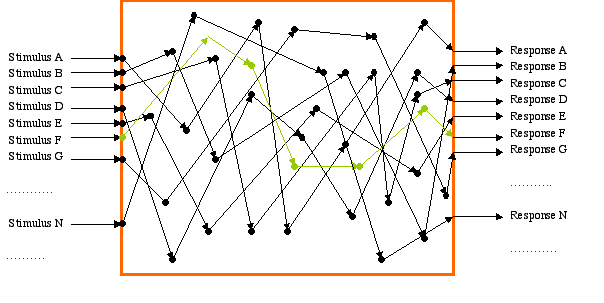
| Virtues
|
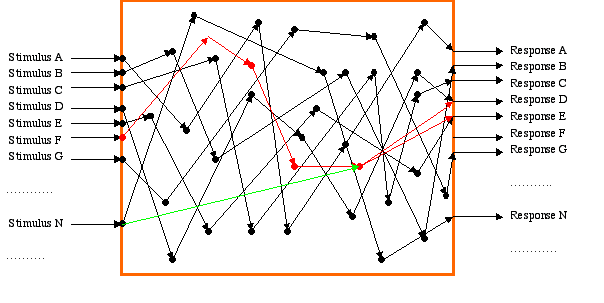
| Virtues
|
A rethinking - boxes in boxes
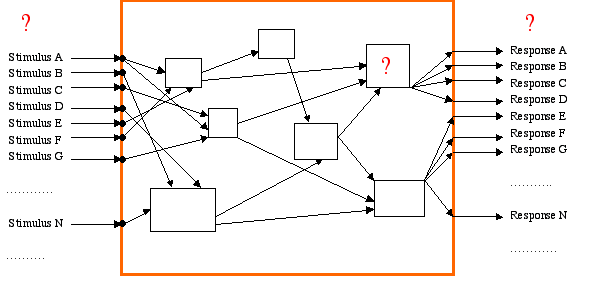
| Virtues
|
Facing up to the stereotopy, stimulus-response problem ... freeing the box from the outside world, adding autonomy
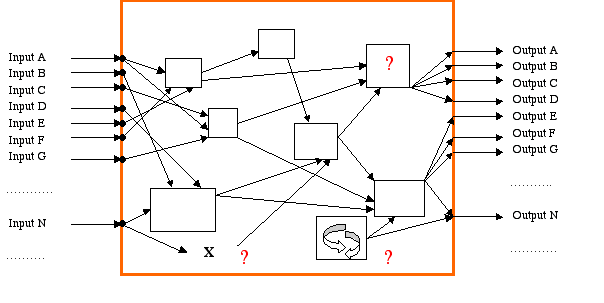
| Virtues
|
Go on to look at actual nervous systems to see if they satisfy expectations and to address issues ... further iterations ("getting it less wrong") to come?
The "real" nervous system - different if behavior different?
The "real" nervous system - an input/output box consisting of interconnected input/output boxes?

| 
|
| photo from Kemali and Braitenberg, Atlas of the Frog Brain, Springer-Verlag, 1969 |
Each box in turn (somewhat arbitrarily) subdividable into smaller boxes (with some differences among vertebrates, to return to)
And those ... yes, "its boxes all the way down"
The smallest box: neurons everywhere
Invertebrate nervous systems also have neurons, but differently arranged - makes sense?
Neuron as common, smallest box and as input/output element, connected to other boxes
|
The idea that an arrangement of simple things can create something very complex is often overlooked and taken for granted. However, all around us, there are tangible examples of such a setup. Even society, for example ... Maja
The understanding that at the most rudimentary level we're composed of the same kind of cells and that it's the organization of these basics that is the key to the difference between species, individual organisms and I guess individuals themselves to me is an amazing result ... Mridula In class on Thursday we discussed how the brain of every animal is different. Could we go further as to say that because we are all individuals, each of our brains has different wiring that is not yet detectable by science? ... Tanya I was thinking about the notion of smaller and smaller input/output boxes until you reach the level of neurons and it seemed only half true. I mean if you think about it there are organelles which receive input and then output something [i.e. the ER complex gets information from RNA (the input) and then it forms the basic structure of a protein(output)]. I therefore think that in many cases we must look into intracellular processes in order to find the smallest input/output boxes (depending on your idea of "input/output"). Also I think we must re-examine the concept that neurons have no variation ... Jean the notion that the "outside" affects the nervous system is something that is very debatable. It is the notion of nature vs. nurture, does the nervous system and our genes effect behavior or does behavior effect our genetic makeup. I personally think that there is balance. We start off genetically equipped, but our culture and experiences have the ability to act upon our nervous system—at least this is the way I want to think about it! ... Shirley What do we think about the model as more organic—one that is either destroyed and recreated with each input, or one that somehow rebuilds upon past integrations? It seems reasonable to say that we can superimpose the model on b=b because if the order of boxes is always changing in response to different inputs, then we can account for the incredible diversity of behavior that one organism is capable of ... Lindsey Depite the input from the child's environment encouraging 'her' to be female, something in the brain asserted the maleness of this person. This also raises questions about gender identity disorder, transexualism, etc. Its very possible then that their brains are ocnstructed in such a way that they are indeed of the opposite gender, although their body is not ... Dana Personality is a construct of the self, it is not the self, but one's personality is a marked part of the self. However backwards that sounds, it makes sense to me. From this standpoint, yes the self is a parasite that lives off of the body. ... Allison If the brain is argued NOT to define the self (as was argued with the siamese twins) then what parts of the brains are? How are we to distinguish between the various functions of the brain to the extent that we can identify the characteristics that define the "self? ... Sarah In response to K.'s post about criminal behavior, in relating the brain=behavior issue to personal responsibility, she seems to imply that if our behavior is only rooted in our brains, then we—-as individuals-—must not have any kind of responsibility for our behavior. I don't think this is the case: deciding that the brain is the cause and creator of behavior is not saying that the world is wholly determined. It is only saying that our behaviors are rooted in our brains, that our brains are the processors of our actions and the keepers of our identities. And even if we were to say that the world is determined and that free will is an illusion—-again not necessitated by the brain=behavior principle—-that doesn't necessarily rid individuals of having to take responsibility for their actions ... Tegan I believe that consciousness, and all that can be related to a brain or soul are merely tools which have evolved as being the most effective means for maintaining a survivable procreation machine ... Michael I personally thought it's interesting that the different prayers of the different religions in the world that are rooted in vastly different histories and cultures would seem to have a common effect on brain activity:) ... Amy "Do we always need some kind of go-between to mediate from ourselves to the universe?" (that could be either a priest or a brain?) My initial response was of course we do. But I see brains and priests as exceptionally different things. And what do we mean by the universe? Without a brain we would not be able to grasp the concept of a universe let alone think of what we want to communicate to it. But, I believe that we do not need such things as priests to communicate to the same universe ... Amanda The boxes inside boxes model we looked at in class hints at the near impossibility of linking outputs to their causal imputs on a purely physical level. I am wondering if the idea that brain=behavior implies that for every (what we call) mental state there need be a specific, identifiable physical state that corresponds. Could mental states have causal properties? Would they supervene over corresponding or roughly corresponding physical states? Also, does acceptance of brain=behavior in fact call for a rejection of the existence of mental states altogether, and would we be better off not even talking about our beliefs and desires ... Maryam |
Can use boxes->boxes ... ->boxes(neurons) to show that larger boxes interconnected, in relatively specific ways (anatomical specificity) and to rigorously specify "input" and "outputs" of largest box ... nervous system itself
So ... at least parts of our box within box model real ...
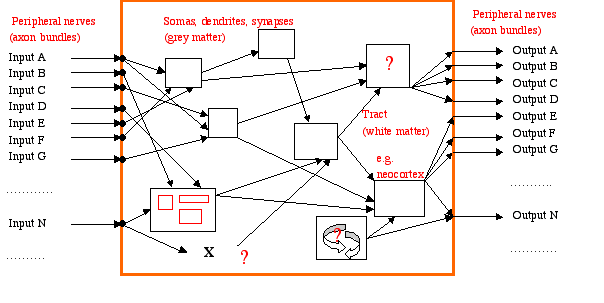
| Additions:
|
Outputs - topographic organization - anatomical specificity
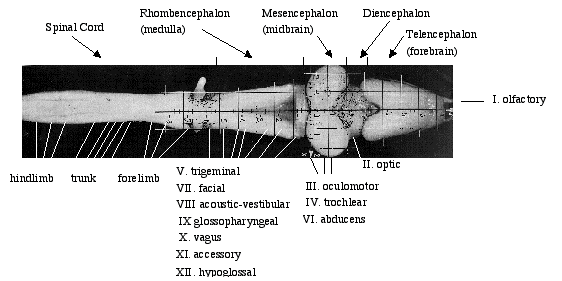
| For additional information: |
Observations "surprising", but have to be accepted - Issue is "how to make sense of them"
Two kinds of behavior ("reflex" versus something-else) intuition probably not useful
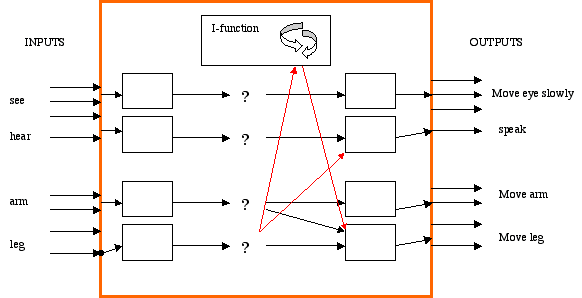
| Ascending somatosensory pathways |
| An emotion like jealousy - either being jealous or the degree of jealousy we may feel - which we feel that we have no control over, in Buddhism, the test is that you must recognise this and try to change this negative trait ... Sonam
If a person acquires a genetically inherited illness, does that mean that they were bad in their previous life? ... Jean by bringing god and/or religion into this discussion, i'm thinking that we can inspect/question all areas in order to be "less wrong." ... Sonam
Misty is all white, but the end of her tail is sooty. She won't clean it; it seems that she does not acknowledge it as part of herself. Now, if this is simply the result of the severing of the tip-of-tail-to-I-box-cable, then wouldn't that mean that Misty, with her I-box, is just as human as I am? I'm willing to admit her personality, her intelligence, etc, but to admit that a cat is as human as I am, that there is nothing special about humanity...this is just too much. Which is why I believe there has to be something more to consciousness and self than just the physical entity of the I-box ... also begs the all-important question of what is Humanity ... Emily Why can't the "I Function" be the entire big box - the entire nervous system? ... Debbie I was shocked to be told that it was possible that after the initial blackout I had continued to drive for about a mile before I woke up again ... Chelsea With the idea of the I-function, when I say that I can't feel my chin, I still feel attachment to it, because it's on my body, and it's still pretty functional as a chin (although i don't really know what the function of a chin really is) ... people with Parkinson's suffer from loss of control of their joints and muscles. How does the I-function apply to these people that have such a loss of control of their body, but can still function normally most of the time? ... Elissa I used to have this weird idea, a couple years ago, that ran along those lines- of being a parasite in your own body. I used to wonder if I was just some nebulous presence sitting in the brain of someone else. Because you *don't* really have conscious control over most of the things that your body does. And even the things that you do have conscious control over, it's difficult to see how that control comes about, sometimes. ... Anjali
Does Christopher Reeve experience the sensation of having a body independent of physical touch? If we don't need a body to feel a body, what does this say about the I-function? If anything, both examples support the I function in some ways because the brain finds some way to generate a sense of wholeness, regardless of our physical bodies. However, this raises another interesting tension between our sense of self as mediated by the outside world (when someone pinches C.R.'s toe and he says "ouch") and our internally generated physical sense of self (C.R.'s ability to voluntarily feel and move his toe) ... Lindey From my understanding, the I-function reports internal states and then possibly initiates outputs/actions. In the case of Christopher Reeves, the lack of outputs/actions does not seem to necessarily mean that the I-function is damaged ... Allison Apparently the frontal parietal lobe is the specific location of the perceived self. I was intrigued by this because I began to think about what happens when people have malfunctions in this aspect of the brain. So I found out about a disease called frontotemporal dementia. As I understand it, it is a form of Alzheimer's that specifically targets the right frontal lobe of the brain. What is interesting is that many people who suffer from this disease go through complete personality changes ... Brad I would say that the woman still had the aspects of her personality that made her herself, but she could not control her body at all, even enough to talk. So would that mean that the I-box is still functional and whole, even though she cannot express her personality in the same way as she could before she became so sick? ... Ariel isnt it possible to have different types or degrees of I-box, so that a cat's box containes a sense of the body as belonging to the self whereas the human box contains that and more, or that to a higher level? ... Dana Exploring the concept of I-f also could be useful when studying mental illnesses. Some individuals with depression claim that they aren't themselves ... Jenny There are things that may change our I-function, from good to bad, bad to good, or some other combination, but that doesn't necessarily mean that it is our "self" that is lost. It has simply changed ... Erica One question that I had in class was the issue of individuals who have disorders like multiple personality disorder. How is the idea of self in individuals with multiple personalities reconciled with the idea of the I function? ... Liz We are so used to thinking of the nervous system as something that serves our purposes in allowing us to walk when we want, to talk when we want etc that it's a bit disconcerting to think that our conscious sense of self is not in fact running the show; but rather, that the I-Function is just one more box in the system. An *important* box, but a box nonetheless. This makes me wonder a bit about psychoanalysis ... Maria humans themselves are machines, we are nothing but parts, connected somewhat haphazardly, in order to make one larger machine function properly. In using Christopher Reeves as an example, the trauma of his accident disrupted part of this fragile machinery, thus having this "machine" lose it's ability to function the way it was meant to be built. This flaw though, it what has created humans as we are. If, in developing medicial breakthroughs to allow the nervous system to be reconnected, we allow for perfection in humans, where will this bring us. What would the side effects be? ... Katina In terms of the idea that our parts are connected haphazardly, I think it would be interesting to examine the degree to which our brains are reflective of modular structuring and how much of that modularity is the result of evolutionary processes ... Prachi after years of intensive physiotherapy he has slowly regained sensation in some areas of the lower parts of his body and can breathe on his own for a period of around 90 minutes. If neurons cannot be generated than how do we explain these phenomena? Does this mean that his nervous system is slowly adapting to these new sets of conditions and growing and re-organizing itself to regain a new state of normalcy? ... Mridula I feel that to view our actions as merely resulting from random chemicals removes culpability. The truth is, we don't follow every impulse of our brains, we can't excuse our actions by saying "My brain did it...I didn't have any control." To a certain extent, brain does equal behavior, but I think we need to qualify this statement by remembering that we are capable of choice ... Nicole
I felt that the discussion about Christopher Reeves was very interesting, because I automatically thought that he was completely paralyzed ... Chevon I was always told that a reflex occurs when a signal is sent from the sensory neurons to the spinal cord then to the motor neurons without first visiting the brain. (This emphasis on sensory and motor neurons is also why the idea that the vast majority of neurons in the nervous system are interneruons is quite shocking.) I guess this new concept of "reflex" goes along with the idea that the brain and the spinal cord are not really separate entities, but all part of one nervous system. I do like this new way of thinking along with the topographical organization of input and output signals ... Kristen I am finding it difficult to remove "reflex" from my vocabulary ... By using such a word it divides the nervous system. The problem with that is where is the dividing line? As we have learned in class the neurons that control eye movement are within the midbrain and those that control the knee-jerk response are within the spine. Yet they both move, so clearly the location of the neurons is of little importance when discussing general motor function. The difference I continuously want to make then must be in complexity of responses. What are those inputs that require a large number of "boxes" which have "boxes" inside them to produce an output? How do they differ from those that only use a few "boxes" and why does one input need more processing then another? ... Kimberley A cable had indeed been injured with Reeve's fall, but other wires were still present ... the only thing impaired in Christopher Reeves is his ability to receive information and control that part of his body ... FYI, there are 131 different kinds of Paralysis listed in Dorland's. Apparently, our nerves system is a little more delicate than one commonly thinks ... Ginger The physical contiguity principle summed an interesting observation about cable connection between signals in one part of the nervous system with another. As did the notion that boxes can generate responses of their own ... Erin In my Physics class on Friday, we were discussing electric potential, resistors, capacitators, etc. and talked a bit about the nerve being a real life case ... Think of the body as a number of circuts, and that a circut is complete if a point on the NS and a point somewhere on the body are connected and information can flow between them. ... , the pinch toe-> foot withdraws-> say ouch requires 2 different circuts. In C.R.'s case, the 1st circut is complete (pinch toe-> foot withdraws), but the second one (pinch toe->say ouch) is dissconnected or damaged. This would make it possible for C.R.'s foot to withdraw, but not to say ouch. The question about spasms and how signals get spontaneously created-could that just be electrics gone haywire? ... Eleni I have learned in Biology 101 about emergent properties arising from the coexistence and relationships among cells ... I wondered if perhaps this could be applied to the self, brain, and body. Could the self be an emergent property of the brain and body? The consciousness a property of the brain? ... Michelle |
Signals:
Action potential - longitudinal battery which appears/disappears successively at successive points along an axon ("travels" at finite speed), "all or nothing" transient (millisecond range) event
|
if it's "all action potentials, and they in turn are just movements of ions across a membrane," then just what is it that sets us apart from each other? ... Ghazal I have thought about sensing and our perception of things and have reached similar dead ends. Is the problem that we perceive certain situations, smells, textures, colors, etc. differently? Or is the problem on the other end of things; where our senses are fairly uniform, but our reactions differ due to environmental influences. Or is it a combination of both ... Maja green is the smell of grass after a thunderstorm, and blue is the feel of wind on your face on a spring morning, and red is a roaring fire on a winter's evening. It's really interesting, the way that we link senses together in that way. I wonder, though, again, if that's just a matter of associating one sensation with another after having experienced them together many times- or if it goes deeper than that, if there's something more fundamental about the ties between sensations ... Anjali Clearly there has to be distinguishing factors among signals. In recently learning about cell-cell communication in another class, it seems to me that the responses of each cell have to be different. Maybe one potential causes the release of calcium ions which then signals the production of a certain protein, which in turn affects transcription and so on... Meanwhile another cell picks up the same signal and produces an entirely different protein and starts a whole new set of chain reactions ... If this is true than maybe varying behaivor is simply due to varying ion concentration and types within peoples cells, causing the same signals to have different responses in different people ... Brad In genetics, identical twins, though they have the same genes, may have different gene expressions. For exmaple, females inherit two X chromosomes, one from the father and one from the mother. There is only one X chromosome that is truly active; the other one is compressed into a Barr body, tightly condensed so that transcription can't occur ... Amy Action potentials may be an all or nothing process with ions moving across a membrane, but what sets each individual apart is the connections between neurons that we have. No two individuals would have the same connections because genes would play some role, but so would environment ... Liz
Is anybody else starting to view the whole concept of an I-box as a "default" system? ... it seems as though we just refer to any factor of the nervous system, or any characteristic of behavior that we don't understand, as part of the I-box ... In the future, perhaps we should further question the true abilities of this so-called I-box ... Sarah we cannot be sure of the presence (or lack) of an I-Function in other organisms because we cannot communicate with them as fully as we do with each other ... Michael I love the idea that my I-function or some other box gets in the way of doing in reality (repeatedly performing a fairly complex and essential chemistry...thing) what my nervous system can manage basically on auto-pilot. It makes one think that perhaps in somethings the I-function gets in the way ... Maria(h) The first thing that she said to her young patient was "I was upset to be working on Thanksgiving, but I'm happy to see you." When she looked back to see the young woman, there were tears rolling down her cheeks. Though there was no verbal or physical response, I think this nurse's story is a testimony that this young woman's I-F and emotion were still intact ... Nicole I would think that if by being optimistic you increase the health of your body, than that would indicate that your "self" has considerable control over the rest of your body. But since having a positive frame of mind does not increase these patients' live spans, does that indicate that perhaps the "i-box" is less powerful than we think it is? ... Ariel perhaps that is where the distinction lies, whether there is a connection with the I-box or not, will determine the voluntary versus involuntary movements ... Amar I think the idea that the signals in the nervous system can be attributed to simple chemistry is brilliant. It is amazing that something which appears to be so complicated (the workings of our nervous system) can be broken down to ions passing in and out of membranes ... The only thing that appears to separate us from any other machine is the I-function. Then again, when we finally figure out what this I-function is and how it works, chances are it will be just as mechanical as these signals passing through the nervous system ... Kristen |
To understand action potential, need first to understand resting potential - transverse battery, continuously present, with potential for continuous variation
Neuronal signals:
Resting potential ... concentration gradient of charged particles, selective membrane permeability ... can get from there to action potential ...
action potential: adjacent membrane regions with different transverse batteries (because of different selective permeabilities) - Issue then is how to get it to MOVE, with finite velocity?
Notice it is NOT matter moving, nor energy, it is a perturbation (signal, information)
And the big question ... can signals start in the middle of the box?
Yes
Have action potential, resting potential, spontaneous activity, based on ...
Input (sensory) signals - an example
|
(some future web paper topics?) since all humans function in a similar way (breathe, eat, etc), do we all have the same proteins? Or, does a certain protein in a membrane serve different functions for different individuals? ... Debbie Since hypnotism has such a strong impact on behavior it is clear that internal "boxes" can both produce behavior as well as inhibit behaviors that would normally occur in the general population ... Kimberley Doesn't it kinda stand that we all experience things differently? ... Laura When asked what something looks, feels, or sounds like we can go on and on with descriptive characteristics. But if we are asked what does it smell like? It is very difficult to describe ... What is it about the olfactory sensory neurons that limit this capability? or maybe it has to do with the terminal connection points? ... Brad I wonder why some peoples symptoms of depression are directly opposite from the way others experience it ... Natalie i am inclined to believe that like all other forms of "mental illness" or mood disorders, it all comes down to differences in individual biological/neural makeup ... Cham I strongly believe there is a connection between the brain and crimes ... Chevon society and personality are intrinsically linked. Personality is certainly dependent on neurobiological processes. Therefore, society must depend on the nervous system... Natalie
I have a problem with the "I-function." ... Christopher Reeves didn't say, "My toe didn't move," just that he didn't FEEL any pain. What I am trying to say that I think it is too much of a jump to conclude from the observation that because Chris doesn't feel the pain inflicted on his toe, the awareness of feeling a pain is a sufficient criterion of selfhood ... Maryam it is too much of a jump to conclude from the observation that because Chris doesn't feel the pain inflicted on his toe, the awareness of feeling a pain is a sufficient criterion of selfhood ... I think we are looking (or should be looking) at the I-box not as the home of self or of personlaity, despite the misleading name ... I think we should trash the idea of I-box as personhood, which we really havent any evidence for, and focus on I-box as awareness of body ... Dana my question is how are we able to perceive ourselves as the individuals that we are and somehow relay that "person-ness" to everyone else? In other words, I was just wondering how much control we have over influencing the perceptions of us that other people have, to the effect that our own awareness of self matches those of everyone on the "outside" ... Erica Although I was aware that isolated muscle cells still contract on their own, the implications of an isolated Nervous System still "beating" is fascinating to me ... Aiham I find the notion that our brain is continuously generating signals even without input to be fascinating. I think that the internal mayhem of our brain and the notion that sensory receptors "things on the outside" may act as regulators, is a very interesting aspect to consider when examining ourselves and our behavior. Everyone is different; everyone's brain is going off and generating random signals unique to that individual ... Erin If signals can be, and are, produced without an outside "ZAP," Then who's to say what IS from the outside? Put a different way, if your nervous system can make its own input, what is the objective reality of outside? We only percieve some of it, and we percieve lots that isnt it at all, so why do we see the world the same way others do? or do we see it that way? Is there an "outside" at all? ... Dana If the neurons aren't firing in response to an input- if they just fire automatically, how is it that external stimuli are able to keep these signals from being random? How could external stimuli have any effect on such signals at all? ... maybe the idea of blank tanks could be linked to dreams ... Could it be that your lack of awareness about the outside world while you're asleep has a similar effect as a blank tank? Your brain generates its own input, and brings up images and makes up stories in the absence of external stimuli ... Anjali Is something different when we are sleeping that results in us having less control over the nervous system? ... Also, the idea that there could be things going on outside of us that we have no receptors for is kind of disturbing. Then again, there must be some reason that we did not evolve to have these receptors ... Kristen I find this extremely interesting because people themselves have nervous system reactions which they are unaware and cannot control, such as heart beats. But perhaps there are more of these internal signals within us that respond to us in our subconcious, allowing reactions and feelings in dreams, or impulses we can't control...is this inner reaction our instinct? Nothing physically externally stimulate it, but we can gain this feeling ... Humans by nature, are scarcely controlled by our own "free-will," but by the response our body has to the stimulus of our minds and the outside world ... Katina when i was undergoing surgery, my anaesthesia wore off long enough for me to see several people touching my leg and moving it around. i could see them manipulating my leg but i couldnt feel anything at all. this of course was extremely disturbing to me, as it felt as if MY leg was lying flat on the table (thats where i felt that it was and thus that is where i looked for it) however A leg (other than my own) was sticking straight up in the air. it took me a significant amount of time to realize that that random leg was in fact MY leg. after that realization, even though i knew that it was my leg, i still couldnt make any sort of cognitive connection between what i was seeing and any sort of internal recognition or feeling ... Cham Our brains are never silent, and yet we aren't always consciously aware of our own thoughts. But really, thinking varies. As a native English speaker, I think in English ... Since we think in our language, does this mean dolphins "think" in echolocation? ... Emily I usually think in the language that I last spoke in. Therefore, if I just got off of the phone with my parents, my next thought will be in Bosnian, however, as soon as someone addresses me in English, my mind is back to thinking in English. What's also interesting is that the phone numbers from Sarajevo that I have memorized, I can only recall in Bosnian, and vice versa ... Maja frequently (compared to people with depression) people with manic depression do not feel the same disconnect between their "normal" selves and their manic or depressed selves ... Is it really all about balance? Manic-depression HAS a balance, whereas unipolar depression does not ... Is our sense of self really all relative to our default chemical settings? ... Chelsea |
And the big question ... can signals start in the middle of the box?
Yes
Have action potential, resting potential, spontaneous activity, based on ...
Synaptic potentials - Synaptic integration
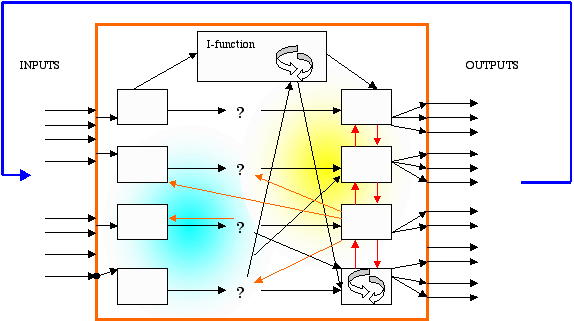
Seeing where we were, where we are ...

Problems solved, new issues raised ...
|
(See also From the Inside) I'm sure that if we were to really sit and think about it, a good portion of our daily actions could actually be seen as being inhibitory rather than excitatory. Do we still have license to blame our brains for making us do something as opposed to preventing us from doing something? ... Erica If 80-90% of our nerve actions are inhibitory, our bodies would probably be incredibly hyperactive if those inhibitory synaptic potentials were decreased. If that's the case, do people with ADD or ADHD have a decreased amount of inhibitory synaptic potentials? My knowledge of ADD and ADHD is that people with the disorder have little control over their hyperactivity and/or their attention span. Their minds seem to just go all over the place ... I know very little about the disorder, so my apologies if I overgeneralized it ... Elissa i have ADD and i have noticed an important difference between those of us with this issue and non-afflicted people. when i am thinking about or doing more than one thing at a time, i can actually pay better attention whereas i feel as though when "normal" people multitask, their attention suffers ... Cham If you find yourself using ADD as an adjective often, it's probably also worth it to invest in a dictionary, thesaurus, or both. It's not all that nice a thing to say, especially since as a group we are so pathologically over-sensitive to every freaking thing that goes on around us ... I have had a lot of practice in looking at something in terms of how I --or some failing on my part-- made it less good than it should have been. In terms of being inhibited or not inhibited, I don't find that the things i do are really abnormal or very uninhibited; rather, I don't always see that given the situation a certain behavior is probably not all that appropriate. When I was 9 years old I flicked my father off with a grin from the middle of the soccer field because I thought he was yelling at me too much (my father thought this was hysterical and tells the story with pride), I wasn't that mad it was more than anything affectionate, it was just what I would have done at home and it didn't occur to me that from the center of the soccer field everyone else saw it too ... Maria(h)
ADDED after class, PG .... Maybe we should get rid of the idea of "normal"? Replace it with the idea that people differ in level of spontaneous activity, inclination to multitask, sensitivity to cues about their surrounding community and the impact of their actions on it .... and perhaps a thousand other parameters as well? Many of which we don't see, aren't aware of, unless/until others tell us about what things feel like inside themselves? Which then gives us useful information/observations to better understand both them and ourselves? (see Diversity at Bryn Mawr: A Conversation and Culture as Disability).
On some basic level, we all have to agree that one thing smells a certain way, that fish smells bad and that chocolate smells good ... Sarah But we don't,, thats the thing. My brother, for exaple, HATES the smell of bananas. It makes him sick. I, however, think they smell great. Also, I like the smell of gasoline, while some hate it ... Dana It seems plausible that one's unconscious associates a scent with a negative experience, and therefore one dislikes that particular scent. The disconnect between the unconscious and the self appears to be the reason one cannot express why they dislike a scent ... Allison
Only after he saw this did his face glaze over and shift to shock. It was as if he needed the physical affirmation of seeing his dangling leg before his mind could melt into shock. What could account for this need? It seemed that although the pain was pushing his body towards shock, his mind also needed to be convinced in order for the entity of his body and mind to slip away from reality ... Michelle A professor once told me that the brain is the only organ in the human body that we can heal by talking to it. And this got me thinking about people's ability to convince themselves of certain feelings ... Maja Besides the ablility to change our feelings and opinions through conditioning, we also repress painful or potentially harmful memories. Even though we may eventually need to release these memories, the ability to supress them definately has short-term advantages ... Chelsea
I felt a cleaving in my Mind
I know that personally I will have ideas in my head that make complete sense, until I try to explain them, then I have difficulty framing the idea so that others can understand what I am thinking. I know this happens to some of my friends as well ... Ariel There are ideas that I can explain in writing that I find it almost physically impossible to express outloud. The words simply disappear, or get confused and forget where they're meant to go, and the idea itself starts to get tired of waiting about and I start to forget it, and finally all I want is to grab a pen and paper and communicate that way... And then I have a friend who's wonderful at expressing himself outloud. He's intelligent and eloquent and convincing, outloud. But set him in front of a keyboard, and all of a sudden he has nothing to say ... Anjali The question posed was, "do profoundly deaf people who learn to talk have a voice in their head?" The answer was that we can cogitate, daydream and reminisce without employing any language system at all ... From personal experience (as a hearing impaired individual), I feel pretty confident that I "hear" in my dreams, however I do not know if this hearing is that of a true hearing person or the hearing that I have now ... Lindsey Do people ever have the experience that they've thought something out so well that you think you've said it? Is that representative of my brain's to communicate within itself? ... Ginger
(see From the inanimate to ... everything?) If there is a transcendent "reality" that we are unable to grasp, you just have to deal with it, because trying to grasp what is inherently ungraspable is a pretty fruitless activity ... Mike the idea is that if we do question our reality etc. we are approaching this from a philosophical view, but if we get caught up in approaching this question from the scientific basis we are only confusing ourselves. Science will always explain reality, but never answer why this is the reality we have ... Amar when external factors are controlled for and environments are as similar as possible people still experience a personal "reality" different from anyone else ... Erin Though no one can disprove that we are not all just producing electricity for machines. I know that I can be a lot more productive thinking that reality is exactly as I and most other people perceive it ... Kimberley |
Basic idea: neurons substantially similar, integrate currents due to permeability changes, send signals (action potentials, currents, chemicals) on to other neurons
Have general ideas of units, rules of construction ... let's start building, see what we can get to connect the two levels?
Begin (non-traditionally) with output - "action"
Action = "motor symphony"
Accounting for motor symphony
| 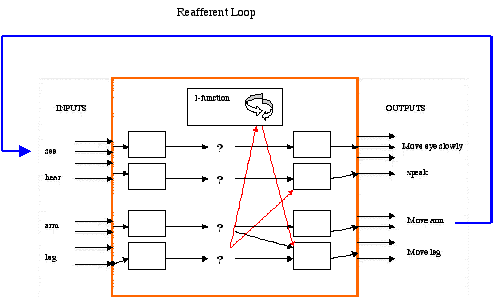
|
Reafferent loop - exteroreceptors and proprioceptors
Looking more closely at the "central pattern generation" hypothesis
Implications of earthworm case
|
What an interesting forum to stumble on ... "Beauty in things exists in the mind which contemplates them." (David Hume) ... Jay (see Beauty Symposium Movies like The Matrix that raise questions about our own reality are fun because they force us to look at something in a new way. They challenge conventional knowledge and stimulate outgrowths in creativity. That being said, I share Michael's sentiment about reality and conceptualizing it--we just have to accept reality as it is ... Ginger Akudo had mentioned that mental illness can be classified as social deviance. Perhaps it is because the mentally ill are often unwilling or unable to accept reality as we see it? By not conforming to the world as the majority of people see it ... they fail to follow the approriate rules and expectations of society ... I think we want to confirm our preexisting notions that what we've perceived to be real is real ... Jenny My point is that it is very possible that what we as individuals (or what our I-functions tell us to) perceive as reality can often be very different from everyone else's reality, and how are we to distinguish between "real" reality and something else? ... Erica
Kimberly spoke of her tennis coach saying "Practice does not make perfect, just permanent". My volleyball coach would always say "Perfect practice makes perfect." It's along the same lines. If an athlete repeats the same perfect motion then it will become engrained in her head ... Amanda I'm sure there has been some point in everyone's academic career where they've crammed for an exam/quiz. You don't know the information well at all, and the night before, you study until your brains are fried. You retain the information well enough to take the exam/quiz the next day, but when it comes time to take the final exam, that material was long gone from your brain ... Elissa I was rewatching memento over break and the main character has a condition where he cannot make any new memories and thus has no short term memory. However, they say that someone with this condition should still be able to learn through conditioning. Does this mean that learning and memory are separate? ... Emma The score of the particular motor symphony, manifest as a 3-point shot in basketball, crisper trill in violin, or neater penmanship, seems to be created during the time we "practice." Our perception -- the way we see things -- seems to change, as a new reality is manifest through our new ability (the mastery of a new motor symphony). ie: We make the connection that we need to hold the basketball a certain way and apply a certain amount of force to make the shot, all elements of a new motor symphony that we didn't have command of before ... Erin if I do a hands-on project I will often retain information better than by hearing it in lecture. I know that everyone learns in a different way, but why? Are there certain aspects of a person's 'i-function' that are stronger, or more developed than other areas? ... Ariel
In response to Chevon's comment ... do people diagnosed with obsessive compulsive disorder know that their repetitive action is not necessary, but their I-function has no control over how many times the do it, or do they think the action needs to be done again and again for a reason and their I-function is controlling the repetitive action? ... Jean Brad's comment about hypnotism , "Is the route of it merely the power of suggestion?" got me thinking about mind over matter. ... I recently read an article (The New Yorker, Jan 20, 2003 v78 i43 p052 ) describing how people could be taught to alter their EEGs. Niels Birbaumer, a leading expert in brain-interface research, taught epileptics to prevent seizures by adjusting their SCPs (slow cortical potentials). By attaching electrodes to their scalps their EEG's where translated onto a screen as a moving ball. They then practiced keeping the ball on one side of the screen, effectively controlling their brain activity. ... I'm ... curious to explore what this indicates about our role in the neural symphony—do we have the ability to "interfere" with the score, or is there simply no central score? ... Shadia In what way does the brain change to accomodate a new idea? the other day, sort of out of nowhere I realized that *ideas* and *concepts* such as freedom and justice that are not innate and which I always considered to exist seperately from myself (by that I mean that I always sort of assumed that my concept of what constitutes freedom or justice would, at least abstractly, continue to exist even when I wasn't actively thinking about it or even after I was dead...) are simply patterns of neurological activity, that they might not really exist in the way that I've always thought they did ... What got me thinking about is that after I read William James, or Malcolm X, or Lucretia Mott, I act differently, the ideas and notions that they write about and represented change the way I behave...and if brain=behavior, then I'm wonering what learning those new appraoches, ideologies and beliefs do to my brain? I mean, literally, HOW does one learn and how is the brain structred to allow for the accumulation of knowledge? ... Maria(h) When I read a particularly remarkable poem, I experience a strange but very pleasant pain-like tingling sensation in my chest and almost stop breathing. I'm sure I'm not the only freak who does that, whether in response to a poem, a musical piece, a painting, or a math problem. How does a purely "brain" activity like reading engage us to such an extent that we respond in physical ways? ... and if it's merely something about our biological makeup that makes us appreciate (or be bored by) art, music, etc., can we justly talk about "smart" people (in the sense of college students who like to learn) and "dumb" people (who hate studying)? Wouldn't it be the same thing as saying that people who hate the smell of bananas are in some way deficient? Maybe the maxim that there is no "normal" and "abnormal" people, but we're all just different applies to this as well. And what does it then do to the concept of high art? If my biological makeup makes me appreciate a ballerina figurine from Dollar General more than Giotto, does it mean I'm "dumber" or "lower" or less refined than someone who sees it the other way around? ... Mariya I recently read a short novel (science fiction) over break written by a neurosurgeon who describes his journey through the symptoms of amnesia/brain damage. It was fascinating to read the novel because he differentiated between his "mind" and his "brain," or in other words—what we know as the I-function and the nervous system ... He also considered volition as a mysterious and perplexing problem. If volition means will power and intentionality, he wondered how the initial impulse to action was generated? I was excited by this question he raised because we had just studied how an action potential can be generated in the middle of the box. ... Ultimately, the novel came back to the larger question of "circularity"—excessive reflection within the brain about the brain itself. Was this dangerous? Why? What are the implications of us thinking about our brains? ... Lindsey
|
 Central pattern generation
Central pattern generation Motor sympony lacks a conductor - coordinated performance of independent players (cf. Boids) - efference copy = corollary discharge
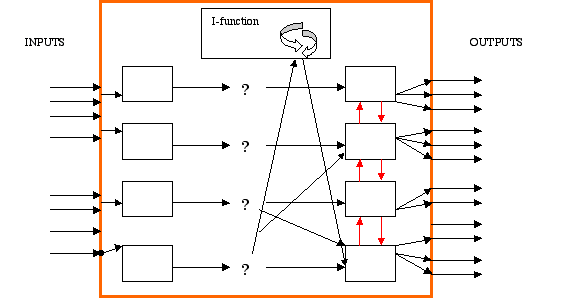
CPG from genome/experience/combination - is interconnected neurons
Look at some more uses/implications of corollary discharge:
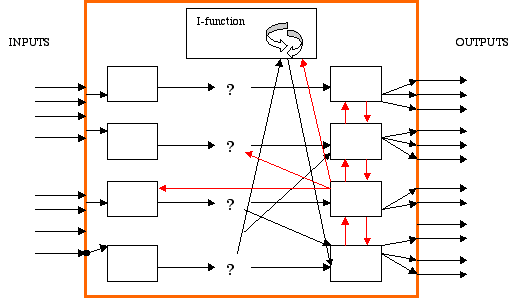
|
That kind of blew me away. Here we move from "it's all the same" (neurons as the basic unit) to "it's insanely complex" (think acid flashbacks while having a freudian slip and a phantom limb tingle) and back to this simplicity and universality. The CNS is difficult to manage as a concept because of its complexity despite its homogenaeity (homogeneousness?)- a concept which implies a degree of simplicity and manageability ... Mike I can see a level of discomfort that could come from learning about the brain. it discounts superstitions that people hold dear, it questions how much concious control we have of our own behavior, and it questions the nature of reality and our perceptions of it. In that sense, it could be damaging to people's worldviews, and as such be seen as a danger. however, i would equate that to things like new knowledge about geology and such proving that the world is very old and has evidence of extinct species, evolution, etc. This challengd the prevailing religious view at the time, and so was dangerous to that way of seeing the world. It was not however, dangerous to the world or to individuals, but rather enlightening. Sometimes we have to do scary things and learn scary realities to develop ... Dana And another implication of this theory is that if a tree falls in the forest, with no one around, there is no way to know whether it made a sound or not- not just because no one was there to hear it, but also because its reality will exist as probabilities unless someone's there to consciously observe it. My friend ended his letter with, "This is one of the reasons physicists sometimes end their days in lunatic asylums." ... Anjali I think this experiment is an interesting one because usually people are able to believe things that they personally experience, but if the input we receive and "our" interpretation of it creates a false reality, where does our sense of "real" reality originate? ... Erica
The more I think about motor symphony and central pattern generation, the more it reminds me of a jazz piece (and NS of a jazz band). In a jazz band, there is no conductor -- the members work with each other and change their music (improvise) both as a reaction to their own thoughts and feelings and as a response to the changes in their partner's playing (and it's actually quite an enjoyable experience for them, they smile the entire time they are on stage). So this fits with the "coordinated performance of independent players" concept. Also, jazz musicians have a score, but they are not tied to it. What makes jazz fun is improvisation on that score, and this improvisation arises both from within the musician (equivalent of potentials arising within the box) and as a result of input from other members of the band (same as NS adjusting our movements on the basis of sensory and other input). If the band (the organism - in biological terms) is well coordinated and has good communication between its members, even the most elaborate improvisation, which deviates from the score quite a bit, is beautiful and coherent. When communication breaks, the music par excellence ends (like the normal functioning of the organism, when the connections within it and between it and the outside world are in some ways severed)...So I think this works nicely ... Mariya This concept is quite surprising to me because I had always assumed that there was some kind of controller box that was perhaps located in the brain ... Kristen When I am on the court playing basketball, I have a natural sense of knowing when I was going to get the ball and a developed sense of knowing what I am going to do with it. But on days that my game is off, both senses are off and I feel that it is not me in my body. As if my mind and body is disconnected ... Akudo Although I do not claim to understand the complexity of [Tourette's Syndrome], it seems like it is quite drastic to say that "they" (meaning their I-Boxes) are unable to control their actions. Does this mean that their I-Box is somehow defective, as it cannot control the actions of the the rest of their body or actions. And, if their I-boxes are not in control, what is? ... Nicole Unlike the guy from memento we dont write down who we are then look back at it just to remember who we are. Maybe in a way we do write things down unconsciously somewhere in the brain, but how would that explain how we know who we are constantly. Is there a region in the brain that is resposible for recognizing who we are constantly? ... Shirley On Tuesday we talked about learning something that gets into your nervous system as opposed to learning something that just gets into your I-fxn ... Eleni logically KNOWING that doesn't seem to make much of a difference in this case ... Maria(h) Now, I can replay the situation in my head so vividly that I find it impossible to imagine that for twelve years of my life I never gave it any thought ... Tanya I had to tell myself repeatedly, "If I can swim, I can definitely float." to keep going ... Amy The brain teaches itself to disconnect smells, feelings, and sights involved with a bad experience and to eventually connect each component with new memories. How does this process affect the neurological mapping? It seems to me that memory erasure would just be an adjustment in the learned motor symphony attached to specific events ... Michelle would it be horribly provocative to say that imitation and learning are the same thing? ... Lindsey
In the case of sciatica, the diagnosis is usually given when the patient complains of stinging pains or sensation occuring when moving the shoulder. Could this sensation also relate to phantom limbs, as stimulation in a certain area of the body once connected to the area amputated result the in nerves there producing an electrical stimulus, thereby creating possible sensations of phantom limbs? ... Katina Do we physically have to engage in an action for our nervous system to be aware that we are actually doing something? If the nervous system operates without "seeing" what physically exists, then does our "physical being" really account for reality at all? In the case of phantom limbs, the nervous system seems to have a mind of its own. Are signals firing off randomly all the time, with varying degrees of relevance and application to everyday actions? ... In the case of people born without certain limbs, the fact that they still experience phantom sensations leads to the observation that signals are not dependent on the experience of having that limb. To what extend does our nervous system exhibit innate tendencies? For example, if I were born unable to walk, does that mean that my nervous system lacks the ability to perform the motor symphony that corresponds to walking? Or does my nervous system posses the innate ability to conduct this motor symphony even in the absence of the physical experience? If I get a prosthetic limb, will it drive my nervous system crazy, or will it help it out? ... Erin If pain occurs in phantom limbs because the brain is realizing that there is something wrong (ie, signals are being generated, but there's no limb there to carry out the action), can someone will an existent limb to feel pain? Obviously you can't make a body part hurt just by thinking about it... Ghazal it is interesting that even paraplegic patients who have had a full break in the spinal cord below the neck experience feelings of pain and burning in the lower limbs ... This seems to indicate that there are other areas within the brain apart from the somatosensory network which function in parallel leading to perceptions of pain and feeling ... are these feelings of pain real or just imaginary simulations created by the brain? ... Mridula
There's a new movie out called "Eternal Sunshine of the Spotless Mind", in which one of the main characters has the tumultuous parts of her relationship with her boyfriend removed. If we were able to pinpoint an area in our brain that would completely remove a part of our memory, how would our "new reality" be defined? What if this removal of our memory made us lose a substantially important memory, such as the birth of our child? Would we be living in reality? ... Elissa If they met someone similar to the person they'd had removed would they experience emotional responses to them "learned" from the previous relationship, even though they have no memory of it? Basically, things must exist/have wider reaching effects than the isolated locations we put them in (because the boxes are all connected), so wouldn't it be impossible to remove someone from your mind because you still have their impression upon you? ... Chelsea This article made me really reconsider the hierarchy governs our sense of reality. I often credit my brain with what I perceive. However, in the aforementioned case, it seems that our senses are masters over what makes up reality. When a sense is altered, our perception is as well ... Is what we know, only what we see? ... Ginger What's the point of confirming our experiences of reality to be Real (or convincing ourselves that it isn't, for that matter)? Truth is messy. If truth or reality is individual and subjective—as cases of phantom limbs might suggest, for example—it seems that there is at least some support for no one in particular's concept of reality to be true. Any one of us could have it wrong, and there is no Deus ex Machina, no final arbitrator to tell us who has it right. If one person can have reality wrong, than any/all of us could, too; and where is the usefulness of a concept of a True Reality to which we cannot be sure any of us has access? ... Both of the posts I mention appeal—at least in passing—to interpersonal interaction as maybe providing an answer, and I think they may be right. If we think of reality as a learned social norm built over time and not as The Way The World Is, it makes sense to speak of what is real and what is not ... In trading an external reality for a self/socially constructed one, we trade uncertainty for flexibility. In this conception of reality, we can't know that we are right, but who cares? We can't know if we are right thinking of reality as external or fixed either ... Tegan |
| the nervous system is doing things that affect behavior and the experience of being without one being aware of things it is doing = "unconscious" the nervous system is doing things that create awareness (and can affect behavior and one's experience of being) = "I-function" there are some unsettling aspects to this arrangement, but also some attractive ones the information flow (or lack thereof) between the unconscious and the "I-function" is an interesting problem, and probably not fixed/invariant
|

Issues (worth some forum discussion?)
|
Once when I was about 15, I sleep-walked from my bedroom on the second floor downstairs and into the kitchen, put on a pot of coffee and got out a bowl of cereal. Then, without touching any of it, I went back upstairs to bed. Now I don't remember this, but my mom saw me heading upstairs and found my mess in the kitchen. So what was going on there? I don't remember a thing ... Laura It seems like the I-function isn't regulating the sleep walking experience, and when the person wakes up, the I-function wakes up and is startled and confused ... Jenny Did you know if you type "sleepwalking" into google, a bryn mawr neuro webpaper is the first response? Here: http://serendipstudio.org/bb/neuro/neuro99/web1/Howard.html. Its a good paper, very informative ... Dana
I was thinking the other day about how strange it is when a dream that I'm having requires some sort of sensory experience--for example, that in my dream I taste something or smell something or fall over and expect to feel pain when I hit the ground--but don't. At least in my experience one doesn't actually have any of those sensory experiences, but there is some echo of the sensation that I am dreaming of having ... This isn't the case with sight and emotion. When you are having a frightening nightmare you don't feel a watered down version of fear, it's real fear ... I have these sort of strange episodes at times when I'm going to sleep where just as I'm drifting off my I-fxn seems to wake up but the rest of my body doesn't. It's this really uncomfortable state of being awake and trying to move and not being able to. The episode only ends when I sort of wrench myself awake...it's a really bizarre experience. I've heard it called 'sleep paralysis' ... Maria(h) A professor I once worked with believed that the flashbacks that characterise PTSD are a result of your unconscious attempting to integrate snatches of affective trauma memories into a coherent whole such that once this whole narrative of the trauma event is achieved, individuals can begin to reconcile themselves to the emotional impact of the trauma itself ... Prachi Prachi's comment on PTSD reminded me of Tuesday's class and how we discussed the I-fn's ability to suppress the feeling of physical pain. I was wondering if this could apply to memories as well. We mentioned the whole idea about how an emotional response can be triggered from the recollection of a painful memory. ... If we believe that everything goes through the unconscious first, would this then be an example of the memory but not the pain making into conscious thought? ... if in place of the actual emotionally painful response to the memory there might instead be only a memory of the pain, which has a degree of third-person-ness. People sometimes say that they've had the experience of feeling as though they were an outsider looking in on their own lives. What if the same holds true for a memory, and what effect does that inevitably have on the individual? ... Erica not only do we have that memory of learning to ride the bike for the first time, but of all the other times we ride the bike, as well as numerous other associations we have of it. In some ways memory becomes a web mapped around various parts of our brain. Not only is it difficult to locate its origin, but it allows for us to exist as ourselves every second as a "ubiquitous" pathway ... Lindsey The dreams I remember are always such a random combination of images and experiences. Is my brain combining past experiences with imaginary images for the purpose of regulating or erasing these experiences from my brain? Does waking up and remembering a dream compromise the function/purpose of the dream? ... Allison
In Multiple Sclerosis ... what occurs with the motor symphony? Is it "out of tune" so to speak, or is it, as well, affected by the disease? ... Is there some deterioration in the brain that leads to clumsiness or another sign of a lack of coordination, connected to the symphony? ... Katina Optic neuritis, the name for MS induced degeneration of the optic nerves distorts spacial perception and sight deteriorates much in the way it does with old age (second level). Thus there is a difficulty interpreting the output of the rest of the body and reacting to it. i.e. Walking down a flight of steps requires constant output as a direct result of perceiving the body's location relative to the stairs, etc ... Mike why do you get dizzy when you're spinning? You're the one who's initiating the movement- your body ought to know that yes, the world's spinning but that's ok, because you're the one who's causing it to do that. And yet that's not true ... Anjali When you spin, the endolymph in your ear spins with you. It tells the brain that you are spinning. However, when you stop, the endolymph keeps moving. Thus, your brain receives a signal that you're moving from the inner ear, although your eyes say, "hey, we're stopped." This confused brain moment results in lovely vertigo ... is it healthy for your brain to be confused every once in awhile? ... In my modern dance class, we would do a warm-up called the "brain dance." It consisted of a series of movements, including spinning in one direction for a minute ... Ginger i offer some personal experience- i have Meniere's Disease and can tell you that it is a form of "dizziness" unlike any other, whether it be self-inflicted or not. Although the etiology of Meniere's Disease is not fully understood, it is somehow related to a malfunction of the endolymphatic sac mentioned in a previous posting. it is also associated with the body's sodium regulation and endocrine activity. Attacks seem to be brought on by stress, but why? Perhaps there is an interaction with blood pressure and the malfunction of the endolymphatic sac, as it would explain both the relationship to stress as well as to increased sodium levels in the body ... Cham Over spring break, I went to a place called Wonder Works in Orlando, Florida ... The entrance into the first floor of exhibits was a tunnel. In the tunnel, there was a suspended walkway about 20 feet in length. A giant and continuous spiral was painted on the ceiling, floor, and walls of the tunnel. The ceiling, floor, and walls moved in a clockwise manner, much like a mouse wheel ... as I took two steps in, I began to feel like I was turning upside down, and clutched to the handrails ... my mind would start to believe that I was stationary, but if I caught even a little bit of the moving walls, I would lose focus and feel as though I was motion ... one's overall reaction to both illusion and reality is a specific blend of all our senses, the tools we use to interpret situations we are faced with ... Michelle Sit down in a chair and make clockwise circles with your right foot. After a few circles, lift up your left hand and write the number 8 in the air. Is your right foot still making clockwise circles? If it is not, why isn't it? Try again real hard to see if you can do it ... Debbie
Is our behavior a result of corollary discharge signals or is our behavior a reaction to what our I-function dictates? I get motion sick – even on very short distances (like on the Bluebus to BM or Haverford) as a result, I ride with my head against the window in a certain position and sit in the same seat. The disconnection between expectations and input cause me to behave in a certain way – without involving the I-function. However I am very conscious of what I am doing ... In principle, behaviors would seem to be accountable by corollary discharge signals and their resultant processes – w/out the I-function, if that is the case when do we become conscious of our behavior? Are we never conscious of what is being fired in our nervous system and only aware of our responses to the degree that they are physically observable? ... Erin Upon first glance, Pleurobranchea seemingly exhibits free will, which we then learn it does not in fact have. But can the same be said of us? I don't think so... because I feel *certain* that given my actions in any situation, I can imagine having done the complete opposite. It sounds simple enough... Pleurobranchea, if it were complex enough, could not experience having the concept of a withdrawn proboscis while eating just like we cannot have an internal battle about whether or not our hearts should beat. The interesting thing is that the question of choice and the ability to determine what it is we have "control" over is inextricably tied to self-awareness and the I-fnct ... Shadia |
Have some useful "boxes"/concepts from thinking about output side in terms of possible origins of motor symphonies ... and some new questions
Output affects input ... input affects output?
Let's reinstate reafferent loop, see what new things that gets us
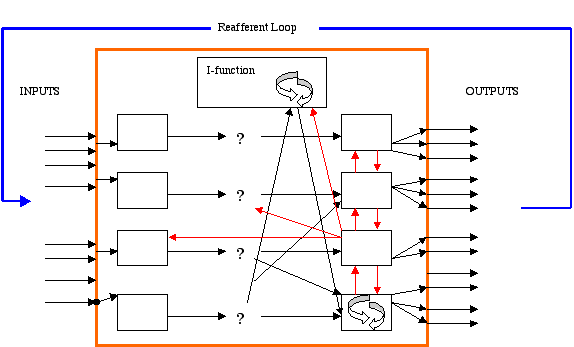
Stretch "reflex"
Not an input-output pathway but a feedback loop
Have motor symphony, central pattern generation, corollary discharge, "purpose", "choice" without I-function
What more from motor side?
Many more boxes/tracts relevant to output side of nervous system (alternate, and another)
Cerebellum, basal ganglia as "loops"
Focus on motor cortex
|
Dreams can be so vivid that a person might not be sure if it happened or not ... Amanda I went through several minutes of believing that the dream I had was an actual experience at work until I remembered that I was not at work the night before ... Liz it would suggest that dreaming is a more physical process than we imagine it to be ... Lindsey The motor symphony theory makes sense to me but what doesn't is the abiliy to store those symphonies. In the real world we put the scores on paper or the music onto a CD, so I assume these would represent our memory ... Brad I know Prof. Grobstein said we would talk about dreams later, but ... What are you conscious of when you dream? Somehow your senses are still connected-through memory, I guess-which come out when you dream ... I had another dream last week that really illustrates the connections the brain is making during a dream. I was dreaming that I was swimming at the beach and I was walking over these really pinchy rocks. The bottom of my feet started to hurt so I looked and saw I had little cuts on the bottom of my foot from the rocks ... was my brain just using the string of events from the memory or was it taking logical steps and re-thinking an explanation? ... Eleni The brain must know what memories to put away because it knows when memories alter the state of your body. When I remember negative memories- i disconnect myself ... Shirley I am extraordinarily poor at distancing myself from memories that were at one time upsetting. In fact, if I think seriously about an event that was painful or hurtful or upsetting, it doesn't feel like the echo or the shadow of the experience...emotionally and even physically it feels that it's happening again. I suppose another way to say all this is that my memories of experiences don't dim with time...I don't have good boundaries between the "me" that had an experience in the past and the "me" of right now. I don't know if this has anything to do with being ADD. In my case ADD causes me to experience the world in a very immediate way and I've wondered if the overly intense nature of my emotions are due in part to the fact that I experience them with the same context-less immediacy that tends to characterize my interactions with the world at large ... Maria(h) my brain's ability to play that back over and over again never ceases to amaze me ... Natalie Relevant:
You know when you are watching a movie or TV and some bloody accident happens and say a person has their arm sawed off or something...why is it that your arm starts hurting? ... Sarah I have always thought that this pain you describe is sympathy pain or something of the sort. I think when I hear of a painful injury or witness someone being injured I imagine how much that must hurt. Unlike your description I don't feel the pain as much as cringe from it ... Millie Relevant:
It is amazing to me what our body accomplishes unconsciously. It makes sense that we have self-maintaining feedback loops for homeostatic purposes such as temperature regulation, or even body weight, but I was surprised how much of our motor functions occur in similar loops. It makes me wonder just how much of our actions we have conscious control of. Do these unconscious loops extend to aspects of ones personality? Are some people introverts and others extroverts due to slightly differing neural designs? ... Kristen for everything that we may say without thinking, or even "think" without thinking, there seems to always be that lack of consciousness, where fault (or at the very least general unacceptability) goes unrecognized by the individual herself unless someone brings it to her attention ... Erica I don't think anyone can say exactly what causes a person to be socially awkward, but I've done some research on a disorder called autism- and an inability to interpret social cues is one major aspect of that disorder ... Anjali If what we learned about set-points and loops can extend to our personalities, is there an unconscious "set-point" that is the nucleus for our behavior – wether it be socially acceptable or not? If there is this nucleus, can it change? If so, can the I-funciton play a role in its evoluation, is the individual aware that they behave differnt, or does that awareness come by way of others commenting about the change externally "My, you have gotten so mature"? ... Erin I think that the bipolar disorder had affected his personality and the ways that he do things; but once the disease had been properly treated, he was able to continue on with his life without the negativity that had resulted from the disorder ... Amy The word "disorder" is a difficult one. All that it truly means, ultimately, is that a person varies from the norm. Varies so much from the norm that it's noticeable, and sometimes debilitating- but still... If a disorder affects a person's personality, like autism (there are plenty of others, I'm sure. I just say autism because I'm slightly obsessed with it.), the person's "true" personality would be the one created by the disorder. If the disorder were cured, somehow- then the person's personality would change ... Anjali
How much of our behavior consists of loops like this? Perhaps even some we believe we have control over is one, and part of our brain is assuring the I-function that it is in control in order to maintain sanity? ... ???? I think our examination of conscious and subconscious control of CNS function should be applied to animalia in general. We cannot discern the existance of an I-function in other animals, but we have now established the idea of "purpose" and "choice" without an I-Function (Paul's words, not mine.) If purpose and choice are not limited to animals (and CNS) with I-Functions, and assuming that other animals do not have I-Functions, they can however be sentient because of the concerted way that their CNS "chooses" to react to maintain homeostasis, find food etc ... Mike
Username: Anonymous See also Today's Lesson for College Students: Lighten Up
After Tuesday's class, I was thinking about optical illusions for some reason ... Is it that my eyes were playing tricks on me or did it have to something to do with my memory? ... Chevon Someone in class the other day was talking about the disconnection of memories, how someone can talk about a traumatic event with a relative amount of calmness and serenity. David Hume called this the difference between experiences and ideas - an experience is something you go through directly, like the pain you feel when you stub your toe, and an idea is the impression that the pain leaves on your nervous system - the memory of the pain, if you will. Hume says that the actual experiences will always be more poignant, more forceful, than the ideas ... Laura |
Recapitulation:
 |  |
Lessons learned "from the output side":
Expectations of what will be learned "from the input side"?
Recall "labelled line" - see lightening, hear thunder because different neurons activated, send action potentials to different places
Vision as a paradigmatic case (is it? ... is at least best studied, and shows some general principals)
"Imaging" - essential role of non-neural structures
Picture on retina and picture in head very different
|
I think it is interesting that people are so fascinated by memory and dreaming versus reality. There are so many movies and books out there that discuss the differences, and almost every one has a unique angle. I think one of the most powerful and interesting is Waking Life ... "To the functional system of neural activity that creates our world, there is no difference between dreaming a perception and action, and actually the waking perception and action." ... Ariel couldn't dreams just be your I-function interacting with itself? ... They are free from external stimuli ... The exercises expand the capabilities of the mind and I-function ... Allison consciousness could exist in a sleeping state. If this is the case, how would the I-function be involved? Would it be possible for your I-function to react to various inputs and to create outputs in your dreams? How do lucid dreams affect what we had assumed about unconsciousness as well as consciousness? ... Michelle
The people who took part in this experiment were told that they were going to be putting their hands in buckets filled with boiling hot water. Except that when the time came to do the experiment, the buckets were filled with ice cold water. And when the subjects reached their hands into the buckets, expecting the water to be hot when it was actually cold, they still received third degree burns ... Anjali whoa whoa whoa hold on a sec....people thought they were putting their hands in hot water but instead they were put in cold water and that was enough to cause actual third degree burns? with all due respect, i dont believe that for a second. is it really true? if it is, ill be completely blown away.... Cham We have examined the inputs, outputs and internal mechanisms of the CNS box, but we are yet to truly address these issues outside of a vacuum, to ask: what is the state of the box in the prescence of other boxes? ... Perhaps we could draw a larger box around a population or sub-population- where messages are sent and received between boxes representing individuals, who are made up of boxes representing neurons etc., The flies in the ointment here would be the issues of centralization and concerted motion/behaviors. I don't think that populations/societies conform to these concepts the way nervous systems do ... Mike
if a baby took this test, would he or she also have the dot turn into white paper? ... Eleni they DO have to learn to interpert these patterns. At least, they are born with blurry vision, which clears as they get older. This might be from eye development, but it could also be that their brains can't interperet the input yet. This idea is supported by a guy Oliver Sacks studied who regained his vision as an adult, with fully functional eyes, and still had to learn how to see. I was just wondering if blind spots were the only circumstances in which our brain decides that it's going to create what it doesn't really know for sure but can infer from surrounding evidence. I suppose I'm just returning to the question of reality and where we can draw that distinction, when we ourselves are aware of two contrasting perspectives within our brains ... Erica The brain doesn't construct an alternate reality with its treatment of the blindspot- our awareness of the blindspot doesn't reach that level. I guess it would be even more accurate to say that the brain actually IGNORES the blindspot rather to say it "fills it in." ... Maryam There is a lot of discussion about filling vs. ignoring, but regardless of how the picture is being made up in the brain, I find the most fascinating aspect is that there is a significant amount of the picture (what we "see") that is being made up in the brain without the I-function. Hence we aren't even aware of it. In relating it to what we experience, what amount of that sensory information coming in to us is being made up? ... Erin
|
Look in more detail at retina and interconnections to get more idea of how much picture in head is "made up" ... and why
How to guess well: using multiple perspectives ... to add depth
| Binocular stereopsis resolving conflict | But ... creating ambiguity |
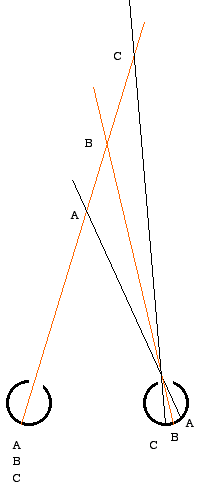 | 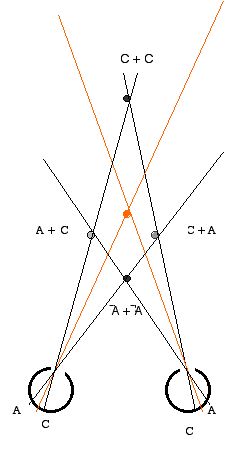 |
Better "picture" by making use of multiple perspectives, accepting/making use of "conflicts"
Ambiguity as fundamental in seeing, sensory systems generally
Can be reduced by using multiple cues, not eliminated (a "useful" gap?)
|
How many people in the class have visual correction aids such as glasses or contacts? What were your perceptions about possible changes in brain response due to the vision deteriorating? ... Katina Why did my vision suddenly plateau like that? I certainly don't do any less reading than when I was in high school. What could possibly account for this sudden change in the pattern? ... Laura I've been wondering since class on Thursday what Magic Eye drawings/photographs have to do with binocular vision ... Anjali One thing I found interesting was that both of your eyes send two different sets of info to the NS. I had always thought of the eyes as "one," but clearly each eye is a separate entity ... It is interesting that the NS rejects the "bad information" from the blurry eye and just uses the info from the clear eye when creating the picture-and thus creates the "best story." ... Eleni people refer to a batter as left eye dominant or right eye dominant. This dominance has to do not with a greater sight capability in either eye, but with a preference for sighting with a particular eye ... Michael
In order to compensate for my lack of hearing, i did find that my vision was sharpened in that it was more sensitive. In other words, I did not develop the power to see further and more clearly than the typical person (no superman eyesight..unfortunately..), but I was able to interpret my visual cues more quickly and efficiently. My hearing loss makes me more observant and perceptive of body mannerisms, details etc that others would not normally notice. i had the ability to read lips amazingly well and from various angles, however, after receiving a device that has dramatically improved my hearing, my reliance on my vision has decreased considerably ... Lindsey My conscious efforts to compensate for things I can't quite see but I know are there, pale in comparison to someone whose nervous system is constantly making the 3-D judgments without the I-function ... Erin I fell like maybe my brain is having trouble filling in the social meanings of these movements, and so it throws out the information, like it throws out tiny details of the scene around us. We remember the general picture but not where each leaf and bird was, and my brain looks at the general picture but not each subtle signal. This causes a lot of problems, because my brain is ignoring information which my I-box would quite like to have, because it would make social situations easier ... Dana unlike Dana, I feel that I have a slightly above average skill of reading facial and social cues. This probably comes from my childhood experiences ... Maja Much like the brain filling in blind spots, its almost as if the brain "fills in" disabilities by improving other senses or physical aspects. It is this "filling-in" that can account for increased senses as a result of diminished or impaired one(s) ... Michelle
This line between fantasy and reality in one's own head as it relates to dreams and day dreams I think is interesting - where does one end and the other begin? Certainly not between the boundaries of sleep and awake, for how many of us have dreamt of things which have actually happened in our own lives, and how many of us have awakened implicitly believing the things that we dreamt had been real? So where is this line drawn, then? ... Laura If a signal could start spontaneously in our eyesight, does this account for hallucinations? When and how are hallucinations induced? ... hallucinations are based on some form of reality, but they also seem to blend into the dream world, the world of imagined forms. How do signals starting in the box and what we are perceiving as the world relate as visual processes? In some ways, our brain "making things up" can be the overlap of the two, but that doesn't seem quite right according what we discussed in class our neurons are operating under a genetic set of rules that dictates this perception ... Lindsey We have talked a lot about how our brain 'fills in' missing areas in our vision. It got me to thinking about what else we might 'fill in.' Certainly when you consider the vast number of daily assumptions we rely on to run our daily lives, our mind must interpret endless implicit meanings based upon the shared assumptions we all share. When talking to anyone, head nods, facial expressions, body language, they all visually and non-verbally clue us in to information we aren't TOLD or can SEE, rather we must interpret or 'fill in' those meanings. In both cases of visual filling in and shared meaning filling in, our mind relies on a set of understandings established through previous experience and memory. We must be taught to unconsciously interpret our surroundings ... Natalie Memories and even the present exists inside your brain, as do dreams. The picture in your head is a representation of reality, but with stuff filled in. Memories are a representation of what used to be in the picture in your head, but garbled, rearranged, and filled in (amd how much of what we remember actually occured? how much did we dream of? how much did we just make up or fill in?) . Dreams are...... a representation of the self? ... Dana Clearly our subconcious is having a big part in the power of suggestion, but can we control it in any way or does it completely miss the I-box? How far can we make this power of suggesstion work? I know we can alter such things as our heart beat by power of suggestion, so could we go far enough to raise or lower it so much to kill ourselves by power of suggestion? Could we fight diseases like cancer with the power of suggestion? What are the limits? ... Brad I was wondering whether people dream in 2D or 3D. I know it's kind of arbitrary, but I was thinking that since our brains fill in so much information for us already, the same must be true in our dreaming states, specifically because it is not reality that we experience. But, how are we able to see the things that are happening in our dreams, and is that experience different for everybody? ... Erica I realize that there is a difference between knowing how to do something and KNOWING how to do something (being able to explain it to someone else). However, I do not think that KNOWING necessarily implies a better understanding. For example, writing has always been one of my friend's strongests abilities, she's an amazing writer. However, when tutoring one summer, she taught math. She did this because she couldn't explain to another person how to write, even though she was an amazing writer herself. Does the fact that she couldn't explain how to write in any way change or diminish her writing ability? I think not ... Nicole |
This is not yellow |
or
Is color an aspect of physical "reality" or "made up" by the nervous system?
Physical "reality"
|
See Forum 14
Second web paper comments this week Final web papers due for seniors 5 pm, Friday, 7 May, for others 5 pm, Friday, 14 May Please make one last visit to the course forum, reread your thoughts at the beginning of the semester, reflect on what has/has not changed in your ideas about the relationship between behavior and the nervous system. Please be sure to complete the course evaluation form. If you haven't done so already, please turn it in when you turn in your final paper. |
Reality always an hypothesis, checked and rechecked ... ?
Different for different people?
Where IS "picture in head"? ... where/what is I-function?
Multiple ganglion cell types - more - multiple samples
Retinal projections ... another ... another
Blindsight and its implications - Don't NEED "picture in head"

Emotion, personality, self
"Creativity" - making what hasn't been
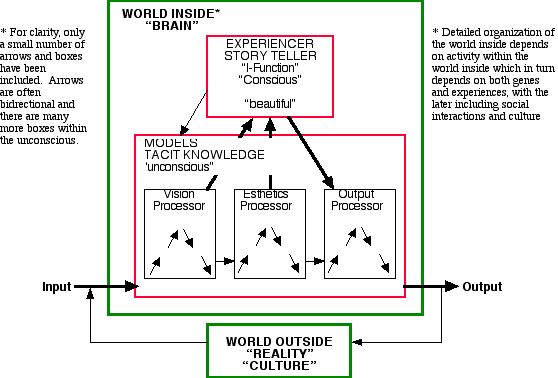
AND, "in the gap"
.... WITH some degree (enhanceable) of personal choice, free will
With acknolwedgement of Descartes:
Exploring some practical implications:
Trust where you are at any given time | 
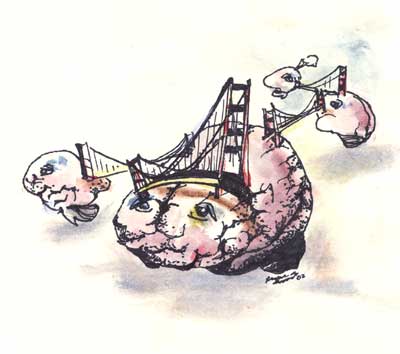 |
|
|
Leave final thoughts in forum area
Keep me posted on your exploring
Happy to have collaborators
To be continued
| Course Home Page
| Course Forum | Brain and
Behavior | Serendip Home |